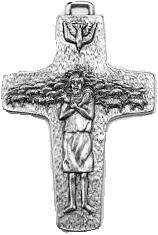
“Today salvation has come to this house” (Luke 19:10).
Thirty-First Sunday in Ordinary Time
Wis 11:22-12:2; Ps 145; 2 Thes 1:11-2:2; Luke 19:1-10
The familiar story of Zacchaeus, the tax collector who climbed a sycamore tree to see Jesus, is rich in many themes relating to mercy.
First of all, Jesus focused his ministry on people who needed God’s mercy. To the shock of many righteous Jews, Jesus ate with tax collectors and prostitutes, contaminating himself with public sinners. He touched lepers, allowed a woman with a bad reputation to bathe and anoint his feet, dealt openly with Gentiles and made a Samaritan the hero of one of his parables. Jesus seemed intent on revealing a God eager to save outcasts and sinners. God was like a foolish shepherd who leaves 99 obedient sheep in the wilderness to go in search of one runaway and lost sheep.
In the story of Zacchaeus, Jesus antagonized his critics by singling out a hated collaborator with the Roman occupation by inviting himself to his house. Zacchaeus was ripe for conversion and was willing to publicly shame himself by climbing a tree to get Jesus’ attention as he passed by. The large crowd there to welcome him was shocked when Jesus called him by name: “Zacchaeus, come down quickly for today I must stay at your house.”
But there is another, even more radical, message in this dramatic story. Jesus becomes the source of salvation and mercy for sinners by changing places with them and taking their sinfulness on himself. He calls Zacchaeus down from a sycamore tree but will mount the tree of the cross in Jerusalem to redeem the world from the power of sin. He is on his way to rejection and crucifixion when some of his greatest signs of mercy occur. In each instance, Jesus becomes one with the guilty, shamed and outcast people along the way.
By the time he is hanging on the cross, Jesus represents every poor, rejected, despised, abused and damaged human being in history. He presents himself to God on their behalf, and God raises him up in glory as a sign to the world that love overcomes sin and death.
We are blessed to be included in this exchange, for Jesus takes upon himself the wounds of sin in our lives, liberating us from guilt and fear to go to God as sinners in need of mercy. At our Sunday worship, we will dine today at the house of Zacchaeus, surrounded by other sinners at the table of the Eucharist, where we will receive the medicine of mercy that restores us to life. Jesus calls each one of us by name and says, “Today salvation has come to this house.”






